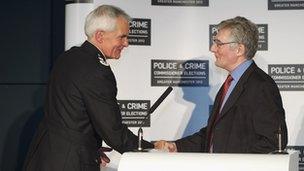How much are police and crime commissioners costing?
- Published

Tony Lloyd, Greater Manchester's PCC, shakes hands with Chief Constable Sir Peter Fahy
How much are the police and crime commissioners costing you?
My colleagues in the BBC News political research unit have been trying to find out how many staff the new PCCs are employing and how much they are being paid.
The figures aren't complete, because there is no central register of the information - but so far BBC News has established the PCCs have employed at least 449 staff since taking office.
The research discovered wide variations in salaries and the size of each PCC team in the 41 police areas outside of London. The Metropolitan Police doesn't have a PCC because the mayor of London performs the same functions.
The Home Office had said it expected the directly elected commissioners to cut costs - but it's not clear yet whether PCCs are costing more or less than the system they replaced
The police and crime commissioners were elected in October 2012 by an average of less than 15% of registered voters - the lowest turnout since World War II.
(Note: The Electoral Commission has separately criticised the way ministers organised the vote last year, saying in a report, external that too few people had sufficient information to make an informed choice of candidate.)
Taken together, the commissioners are responsible for £8bn of spending on police in England and Wales.
BBC News contacted each PCC in England and Wales to ask about their staff and the salaries being paid. The legislation that created the PCCs did not put a limit on how many staff each should take on, leaving it to them to decide what's best for their area. That's one of the key features of the reforms - it's up to local people to decide, through the elections, what kind of PCC they want.
As expected, PCCs overseeing the biggest urban forces tend to employ more people, but there are significant anomalies.
Overall, the BBC calculated the commissioners had employed at least 449 people. The true figure will be higher because three PCCs did not provide the BBC with any information about their staffing arrangements: Cleveland, Lincolnshire and Lancashire.
Greater Manchester's PCC has taken on the greatest number of staff - 40. A spokesman for Tony Lloyd, the commissioner, said that the staff were transferred over from the previous police authority. As things stand he's spending 8.5% less than the authority used to with more savings to come.
The PCCs for Warwickshire and Staffordshire have each employed seven people - the lowest number.
Devon and Cornwall's PCC, Tony Hogg, has 19 staff, far more than larger forces such as Thames Valley, Hampshire, Kent and Essex.
A spokesman for Mr Hogg, who won the election with the backing of about 5% of the area's electorate, said he had inherited staffing levels from the outgoing police authority and had added a director of communications. The spokesman stressed that Mr Hogg was also overseeing one of the largest geographic policing areas in the UK.
Variation in salaries
The BBC research reveals that the salaries of the majority of the PCCs are between £70,000 and £85,000, although the commissioners overseeing the three major forces of Greater Manchester, West Yorkshire and West Midlands each receive £100,000.
However, the salaries of deputy commissioners and other senior officials such as chief executives vary widely. The BBC figures don't include Kent's ill-fated youth police and crime commissioner, Paris Brown, who resigned after a newspaper reported a series of questionable tweets she had sent prior to taking the job.
Suffolk's PCC pays his chief executive £102,000. But Durham, which has a similar-sized force, has a chief executive paid £61,000. Suffolk's chief executive's pay was set by the previous police authority. The Durham chief executive was recruited by the PCC.
While many commissioners have taken on one deputy, Northamptonshire, one of the country's smaller forces, has taken on four at a cost of £65,000 each.
Supporters of the introduction of the commissioners say that it gives local people democratic oversight over policing in their area, because the PCC has the power to set budgets and hire and fire chief constables.
In a statement, the Association of Police and Crime Commissioners said: "It is important that PCCs are able to operate efficiently and effectively on behalf of the public.
"PCCs want to ensure the public are confident that all decisions made are as transparent as possible. [The] BBC figures do not recognise the greater responsibilities PCCs discharge in office compared to police authorities.
"There is also no recognition of the variance in size of force areas. PCCs representing metropolitan areas will have a bigger office budget because they deal with a larger force and population."
One of the big questions about the PCCs is transparency. The Home Office argued that they would be more accountable than the "invisible" police authorities that they have replaced. If the voters don't like them, they can vote them out.
Ed Brown of the BBC's political research unit had the unenviable task of putting together the figures in the table below.
"There were huge variations in the levels of transparency on this data from PCC to PCC," says Ed. "Some of them were helpful; but the vast majority had labyrinthine websites, many had failed to publish much of the information they were required to under statute and press officers were sometimes difficult to get hold of.
"It is difficult to see how an interested member of the public would be able to get hold of this information, which is meant to be freely available."
